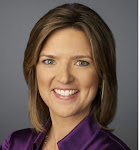In today's post:
- Aneesh Raman speaks at Clinton School for Public Service
- Three Questions for CNN's Aneesh Raman
- Frank Sesno to Moderate Discussion at the 2007 National Conference on the Creative Economy
Aneesh Raman speaks at Clinton School for Public Service
On July 5, 2007, Aneesh Raman spoke to over 150 people at the Clinton School for Public Service. Below are excerpts from an article written by Jason Wiest that appeared in the Arkansas News Bureau the following day:
LITTLE ROCK - Resolving Middle Eastern conflicts, including the war in Iraq, could take decades, or worse, end in a "generational apocalypse," a television news correspondent who covers the region told an audience at the Clinton School for Public Service on Thursday.
CNN correspondent Aneesh Raman shared his experiences and insights covering events in the Middle East, from Saddam Hussein's execution to the tsunami in Sri Lanka.
Raman, currently stationed in Cairo, Egypt, said it was difficult to effectively report from Iraq.
"Journalists are targeted," he said. "It's never happened like this before. Now we're sought out. There's money on our heads and so we have to be extremely careful."

When reporting in Iraq, journalists travel with their own security and normally cannot spend more than an hour in one place because word starts to get out about their location, he said.
The "white noise" of Iraq - incessant news of car bombings, kidnappings and other common happenings - has prompted people to tune out news from Iraq, making it difficult to capture Americans' interest, he said.
"It is a difficult environment to operate within, not just with the security there but also trying to engage Americans in a story that people sort of, in their own minds, have figured out," he said. "What they think about, what they believe, doesn't really change as much."
/\/\/\/\/\/\/\/
Three Questions for CNN's Aneesh Raman
Soon after being appointed Middle East Correspondent for CNN, the South Asian Journalists Association had the opportunity to ask Raman a few questions:
Q: How does this new assignment change your life?
RAMAN: It gives me a home. For the past 6 months I've literally been jumping from country to country with two suitcases and nothing more, so I'm excited to finally have a place of my own in Cairo. Other than that it changes little. As Middle East Correspondent, I will be based in Cairo but traveling often throughout the region. After a year in Baghdad, and most of the past few months in Iran, it is quite apparent that the Middle East is going through seminal change. To see it up close has and will continue to be a phenomenal opportunity.
Q: What have you learned about yourself the past couple of years covering the tsunami, Iraq, Lebanon?
RAMAN: That my addiction to news is so strong it's withstood all the difficulties that come with this lifestyle. To be a journalist is one thing, to live the life of one quite another. But the opportunity to chronicle generational events, from the tsunami to Iraq, keeps the addiction alive and well. ?These are, for me, defining times for foreign correspondents. With rising conflict around the world, news remains a key element to broadening perspectives on all sides. It might be said by every journalist as at every point of their careers, but to me, the news has rarely felt as relevant as it does today.
Q: Any tips/suggestions for young South Asian journalists in the U.S. who'd like to become foreign correspondents?
RAMAN: There will be moments of resignation, when you think there's no way things are going to work out. There will be moments of frustration, when you did all the right things and still didn't get the right result. And there will be moments of immobility, when you think you're stuck in a rut. The key to surviving all that is having an undying passion for news, and knocking on every door at the right time with the right pitch. Don't give up. The opportunities that await those who make it into international news are just too incredible to pass up.
/\/\/\/\/\/\/\/
Frank Sesno to Moderate Discussion at the 2007 National Conference on the Creative Economy
Excerpts from a Fairfax County Economic Development Authority Press Release:
Belle Wheelan, former secretary of education for Virginia and current president of the Commission on Colleges of the Southern Association of Colleges and Schools, will be part of a panel about education, workforce training and creativity at the 2007 National Conference on the Creative Economy set for October 24-25, 2007, at the Hilton McLean Tysons Corner. Jack D. Dale, superintendent of Fairfax County Public Schools, and Robert Kahn, the CEO, chairman and president of the Corporation for National Research Initiatives, will be on the panel with Wheelan.
Additionally, Frank Sesno, CNN correspondent and professor of public policy and communication at George Mason University, will lead the Town Hall wrap-up discussion on the last day of the conference ( www.creativeeconomies.org).
Sesno is an Emmy-award winning journalist, with more then 23 years at CNN where he has served as news anchor, analyst, reporter, D.C. bureau chief and host of Late Edition with Frank Sesno. His recent work has included hosting duties for Sesno Reports for public television, production of a four-part, eight-hour PBS documentary series about weapons of mass destruction and terrorism called Avoiding Armageddon and a 10-part series about global perspectives called Worldtalk.




















































1 comment:
Aneesh looks so young. Everytime I see him, he looks like a high school student covering the war. He does a great job, though and I enjoy his easy going style.
Post a Comment